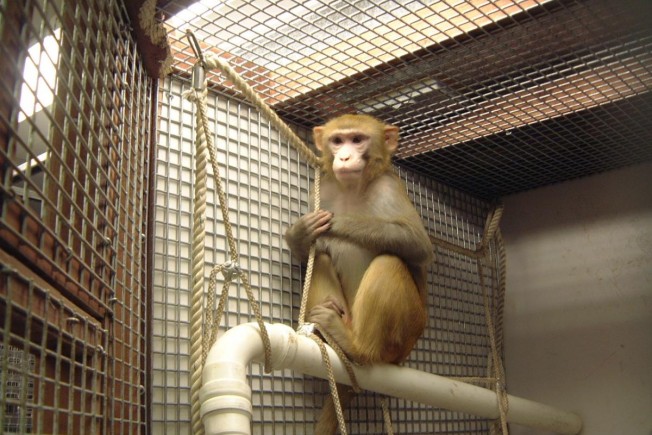Refining food and fluid control in behavioural neuroscience with macaques
At a glance
Contents

Overview
We have published guidelines on the use of food and fluid control in behavioural neuroscience experiments with macaque monkeys which have refined the procedures used in laboratories nationally and internationally.
Control of food or fluid intake is commonly used in neuroscience experiments with macaques in order to motivate the monkeys to perform extended sequences of responses on behavioural tasks while electrophysiological recordings from the brain are made. The control can involve strict scheduling of the time for which food or fluid is available, or a reduction in the total amount of food or fluid provided per day - either way, hunger or thirst becomes a key motivator for reliable performance.
Depending on how they are implemented, food or fluid control can elicit physiological and behavioural responses that compromise animal health and welfare. Coupled with the relatively lengthy periods over which behavioural neuroscience experiments are conducted, these issues make the use of food and fluid control protocols the subject of much concern and debate.
We previously convened an expert working group, which included many of the UK’s leading neuroscientists, to consider opportunities for refining the use of food and fluid control. Based on a systematic review of the scientific literature, sharing and analysis of protocols and data, and the expertise of the members, a report recommending best practice was published in the Journal of Neuroscience Methods in 2010. Key recommendations include:
- Not all behavioural neuroscience experiments with macaques require the use of food or fluid control. Wherever possible, alternative means of motivation with less risk to animal welfare should be used.
- Where food or fluid control is used, the protocol should be tailored to the individual monkey, including identifying the animal’s preferred food or fluid rewards. Individual baseline daily food and/or fluid intake should be established (and periodically re-established) for each monkey.
- Generally, stable performance without weight loss can be achieved by allowing the monkey to obtain its entire daily food/fluid requirement but with controlled or scheduled access to food/fluid – rather than restricting or reducing the amount of daily food/fluid provided.
- Introduce (and remove) food/fluid control gradually (over days to weeks) so that the monkey has time to recognise and anticipate the limited availability of food/fluid and adapt its patterns of intake to maintain health.
- If the monkey fails to achieve its daily requirement in the experimental session, a supplement should be given afterwards. Supplements should be the maximum amount consistent with reliable performance and should be regularly reviewed.
- To ensure adequate intake, monitor daily body weight and perform a daily health check via a scheme agreed with the veterinarian and animal welfare officer. Stability of body weight (fully-grown monkeys) or body weight gain (young monkeys) is a key observation.
The working group also contributed to a discussion of the use of conditioned reinforcers and varaible-ratio schedules, published in Journal of Neuroscience Methods in 2012.
Research funding
Areas for further research to support improvements to animal welfare were highlighted in the working group's report. We awarded funding for a PhD studentship to Professor Alex Thiele and Dr Candy Rowe from Newcastle University to address questions relating to the level and duration of fluid control and its impact on macaque welfare.
A pilot study grant was awarded to Professor Andrew Jackson, also at Newcastle University, to develop and test an automated system that allows monkeys to be pre-trained while group-housed and without the use of food or fluid control. Subsequently, we awarded a grant to Dr Steven Kennerley of UCL to transfer the tablet-based Mymou home cage training system to eight research groups around the UK.
Working group membership
| Name | Institution |
|---|---|
| Professor Verity Brown | University of St Andrews |
| Professor Paul Flecknell | Newcastle University |
| Dr David Gaffan | University of Oxford |
| Dr Kate Garrod | Animals (Scientific Procedures) Inspectorate |
| Professor Roger Lemon | University College London |
| Professor Andrew Parker | University of Oxford |
| Dr Mark Prescott | NC3Rs |
| Dr Kathy Ryder | Animals (Scientific Procedures) Inspectorate |
| Professor Wolfram Schultz | University of Cambridge |
| Mrs Leah Scott | Dstl (Defence Science and Technology Laboratory) |
| Mrs Jayne Watson | University of Oxford |
| Dr Lucy Whitfield | Royal Veterinary College |
Publications
- Prescott MJ, Brown VJ, Flecknell PA, Gaffan D, Garrod K, Lemon RN, Parker AJ, Ryder K, Schultz W, Scott L, Watson J, Whitfield L (2010) Refinement of the use of food and fluid control as motivational tools for macaques used in behavioural neuroscience research: Report of a working group of the NC3Rs. Journal of Neuroscience Methods 193: 167-188 doi:10.1016/j.jneumeth.2010.09.003
- Prescott MJ, Brown VJ, Flecknell PA, Garrod K, Lemon RN, Parker AJ, Ryder K, Schultz W Scott L, Watson J, Whitfield L (2012) Response to Westlund's commentary: 'Can conditioned reinforcers and variable-ratio schedules make food- and fluid control redundant?' Journal of Neuroscience Methods 204: 206-209 doi:10.1016/j.jneumeth.2011.08.038
